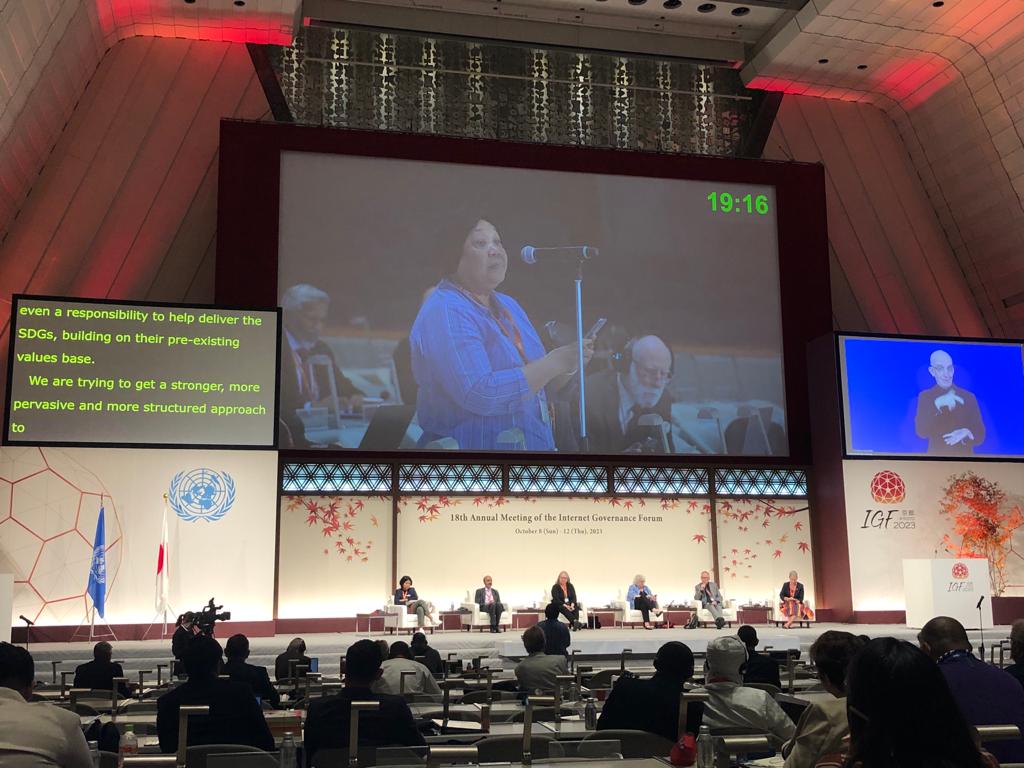IGF 2023 and what comes next…
15 November 2023
As in previous years, in 2023 IFLA participated in the Internet Governance Forum that took place in Kyoto from the 8 to the 12 of October. The overarching theme of this year was “The Internet we want – Empowering all people” and it developed around many sub-themes, the most prominent ones being: Digital divides and inclusion, AI and emerging technologies, avoiding internet fragmentation, global digital governance and cooperation and cybersecurity, cybercrime and online safety.
IFLA’s delegation included staff from headquarters and previous members of IFLA’s Asia-Oceania Regional Division that aimed to use this space as an opportunity to highlight the importance of libraries and information services in the digital era, to emphasize the opportunities and social challenges presented by current technological developments and to advocate for a stronger role for decision-making and policy delivery for the library field.
Four side-events were organized as part of IFLA’s engagement. These sessions were focused on: 1) looking at the types of roles that libraries are playing in partnership with others and in ensuring that the internet fulfills its potential to inform everyone and create the conditions for the fulfillment of development goals, 2) analyzing an effective strategy for mobilizing the global local network of libraries to promote citizenship through digital means, 3) exploring the concept of the knowledge commons and 4) showcasing the evolution of public access throughout the last two decades and what this has meant for its contribution to the goal of a people-centered internet.
During these sessions, both onsite and online speakers that are part of IFLA’s network, touched upon important issues. For instance, Trish Hepworth from the Australian Library and Information Association highlighted the great value of libraries in making digital inclusion possible and Woro Salikin from the National Library of Indonesia talked about the relationship between libraries and economic growth. As part of the Dynamic Coalition for Public Access in Libraries (DC-PAL) session, Dr. Ugne Lipekaite showcased challenges and good practices identified in the evolutions of public access report by comparing the case studies of Canada and Uganda, Maria Garrido and Matias Centeno discussed the state of inclusive connectivity and meaningful access to information via the DA2i report and Don Means exposed the great value of the Gigabit Libraries Network and its commitment to closing the digital divide.
These sessions were also a good opportunity to announce and gather feedback for IFLA’s upcoming update of the internet manifesto in 2024, that will take a closer look at some of these themes, will provide libraries’ vision of the ‘Internet we want’ and will set out a clear and
compelling narrative about the place of libraries in the wider digital space.
IFLA also participated as a panelist for the Policy Network for Meaningful Access session, where we provided a brief overview of our activities included in the fields of connectivity, digital inclusion and capacity development, and gave our feedback on the types of policies that we consider valuable to offer long-term support to these initiatives.
In 2024 IFLA will continue to engage on its intersessional work with the IGF Secretariat via their Dynamic Coalition Coordination Group (DCCG) and their participation in the Policy Network for Meaningful Access (PMNA). And will seek to engage its sections, members and volunteers in internet-related spaces and projects. A possible collaboration with ITU-UNICEF and UPU on GIGA is foreseen in the future as well as an educational project with ICANN’s At-Large Advisory Committee.
